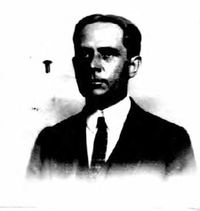Difference between revisions of "Vernon Campbell"
| Line 15: | Line 15: | ||
Campbell was born in 1876 in Iowa. Campbell, with his family, started both the [[Moneta Canning Company]] and [[American Olive Company]] in Los Angeles in 1904<ref>Kemper B. Campbell. In [http://freepages.genealogy.rootsweb.ancestry.com/~npmelton/lacam.htm xxxx Los Angeles County Biographies], Western Edition Notables of the West v. 1. International New Service, New York, 1913. In 1904 his brother, Vernon Campbell, having discovered and perfected the process of canning ripe olives, he became interested with him in the establishment of the American Olive Company, which, under their directorship, became the largest olive packing concern in the world.". </ref>. According to his brother, Vernon was "the first one to can olives in tin", "invented the process of making all the olives look black and shiny, whether they were black and shiny when they started out or not", "a pioneer in teaching the rest of the country to eat ripe olives", and learned how to transport ripe olives in brine<ref>Kemper Campbell, [http://digitalassets.lib.berkeley.edu/roho/ucb/text/campbell_kemper.pdf Reminisces of Kemper Campbell]. Interview conducted by Corinne L. Gibb, Regional Cultural History Project, 1954.</ref>. In 1917, Campbell listed his occupation as manager of the California Growers Association in Los Angeles<ref>Vernon Ottoman Campbell, World War I draft registration card.</ref>. | Campbell was born in 1876 in Iowa. Campbell, with his family, started both the [[Moneta Canning Company]] and [[American Olive Company]] in Los Angeles in 1904<ref>Kemper B. Campbell. In [http://freepages.genealogy.rootsweb.ancestry.com/~npmelton/lacam.htm xxxx Los Angeles County Biographies], Western Edition Notables of the West v. 1. International New Service, New York, 1913. In 1904 his brother, Vernon Campbell, having discovered and perfected the process of canning ripe olives, he became interested with him in the establishment of the American Olive Company, which, under their directorship, became the largest olive packing concern in the world.". </ref>. According to his brother, Vernon was "the first one to can olives in tin", "invented the process of making all the olives look black and shiny, whether they were black and shiny when they started out or not", "a pioneer in teaching the rest of the country to eat ripe olives", and learned how to transport ripe olives in brine<ref>Kemper Campbell, [http://digitalassets.lib.berkeley.edu/roho/ucb/text/campbell_kemper.pdf Reminisces of Kemper Campbell]. Interview conducted by Corinne L. Gibb, Regional Cultural History Project, 1954.</ref>. In 1917, Campbell listed his occupation as manager of the California Growers Association in Los Angeles<ref>Vernon Ottoman Campbell, World War I draft registration card.</ref>. | ||
| − | Campbell later was known as the public face of the [[California Cooperative Canneries]], an Armour-backed company intended to help the meatpacker get into the fruit business. After a long battle, Armour lost on anti-trust grounds. Campbell continued as manager for the co-op through at least 1930. | + | Campbell later was known as the public face of the [[California Cooperative Canneries]], an Armour-backed company intended to help the meatpacker get into the fruit business. After a long battle, Armour lost on anti-trust grounds. Campbell must have searched for new customers; on his 1922 passport application, he listed the point of his visit as "to sell canned food". Campbell continued as manager for the co-op through at least 1930. |
Campbell had also been the manager of a Tulare cannery<ref>Canning Notes: [http://books.google.com/books?id=TXlRAAAAYAAJ&lpg=PA13&ots=9U2aDFAoEu&dq=%22central%20california%20cannery%22&pg=PA13#v=onepage&q=%22central%20california%20cannery%22&f=false July 26, 1913 California Fruit News]. Vernon Campbell quoted.</ref>. | Campbell had also been the manager of a Tulare cannery<ref>Canning Notes: [http://books.google.com/books?id=TXlRAAAAYAAJ&lpg=PA13&ots=9U2aDFAoEu&dq=%22central%20california%20cannery%22&pg=PA13#v=onepage&q=%22central%20california%20cannery%22&f=false July 26, 1913 California Fruit News]. Vernon Campbell quoted.</ref>. | ||
Revision as of 21:42, 9 January 2016
| Vernon Campbell | |
| Employer | California Cooperative Canneries |
|---|---|
| Occupation | Canner |
Vernon Campbell was a canning expert and operator of canneries. Campbell is best known for inventing a process for canning ripe olives, which turned into the Lindsay Ripe Olive Company[1].
Campbell was born in 1876 in Iowa. Campbell, with his family, started both the Moneta Canning Company and American Olive Company in Los Angeles in 1904[2]. According to his brother, Vernon was "the first one to can olives in tin", "invented the process of making all the olives look black and shiny, whether they were black and shiny when they started out or not", "a pioneer in teaching the rest of the country to eat ripe olives", and learned how to transport ripe olives in brine[3]. In 1917, Campbell listed his occupation as manager of the California Growers Association in Los Angeles[4].
Campbell later was known as the public face of the California Cooperative Canneries, an Armour-backed company intended to help the meatpacker get into the fruit business. After a long battle, Armour lost on anti-trust grounds. Campbell must have searched for new customers; on his 1922 passport application, he listed the point of his visit as "to sell canned food". Campbell continued as manager for the co-op through at least 1930.
Campbell had also been the manager of a Tulare cannery[5].
In 1940, Vernon Campbell lived in San Andreas in Calaveras county, California, and described his occupation as "promoter and organizer of canneries"[6].
References
- ↑ Lindsay Ripe Olive Company: In Kathleen Edwards Small & J. Larry Smith, History of Tulare County and Kings County, California, Vol. II, Chicago, The S. J. Clarke Publishing Company, 1926., p. 448.
- ↑ Kemper B. Campbell. In xxxx Los Angeles County Biographies, Western Edition Notables of the West v. 1. International New Service, New York, 1913. In 1904 his brother, Vernon Campbell, having discovered and perfected the process of canning ripe olives, he became interested with him in the establishment of the American Olive Company, which, under their directorship, became the largest olive packing concern in the world.".
- ↑ Kemper Campbell, Reminisces of Kemper Campbell. Interview conducted by Corinne L. Gibb, Regional Cultural History Project, 1954.
- ↑ Vernon Ottoman Campbell, World War I draft registration card.
- ↑ Canning Notes: July 26, 1913 California Fruit News. Vernon Campbell quoted.
- ↑ 1940 U.S. Federal Census, San Andreas township, Calaveras County.
